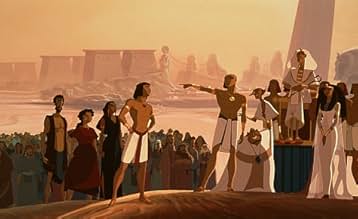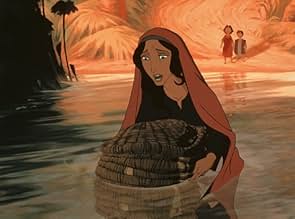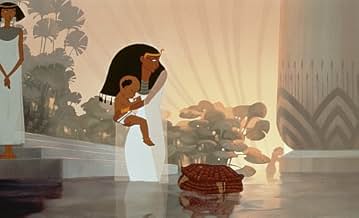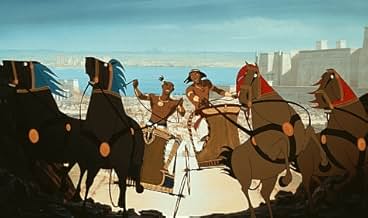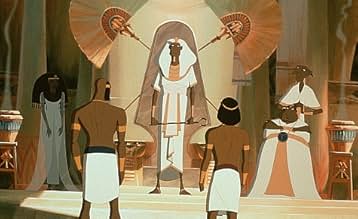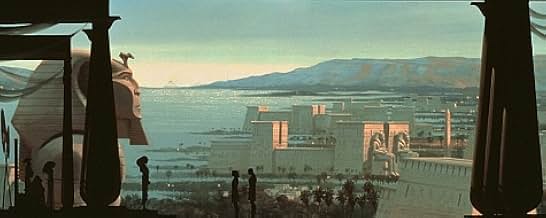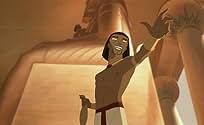Il principe egiziano Moses (Val Kilmer) apprende della sua identità di ebreo e del suo destino per diventare il prescelto liberatore del suo popolo.Il principe egiziano Moses (Val Kilmer) apprende della sua identità di ebreo e del suo destino per diventare il prescelto liberatore del suo popolo.Il principe egiziano Moses (Val Kilmer) apprende della sua identità di ebreo e del suo destino per diventare il prescelto liberatore del suo popolo.
- Regia
- Sceneggiatura
- Star
- Vincitore di 1 Oscar
- 12 vittorie e 27 candidature totali
- Moses
- (voce)
- …
- Rameses
- (voce)
- Miriam
- (voce)
- Aaron
- (voce)
- Jethro
- (voce)
- Seti
- (voce)
- The Queen
- (voce)
- Hotep
- (voce)
- Huy
- (voce)
- Rameses Son
- (voce)
- Young Miriam
- (voce)
- Additional Voices
- (voce)
- (as Francesca Smith)
- Hebrew Child
- (voce (canto))
Recensioni in evidenza
With THE PRINCE OF EGYPT, the DreamWorks animation team has finally taken us full circle and helped the United States join the rest of the world in offering us the first U.S. animated feature since, perhaps, FANTASIA, created for mature audiences while remaining child-friendly. If you aspire to art in any form, and/or specifically love line art and graphics as I do, you must not miss seeing this film on the big screen. I applaud DreamWorks for this triumph in graphic excellence.
Two brief critiques: First, the choice of story. The story is based on Exodus from the Old Testament (and other Scripture) which is scanty, to say the least. Although the studio made an effort to flesh out the story with the Ramses/Moses relationship there is simply not enough meat to go around. This opinion is debatable, a very minor aspect and only my view as a story teller. At the bottom line the overall work is so extraordinary any possible lack in literacy is more than made up for in the visual mounting and production of the film, something which is nothing less than inspiring.
The other criticism is in the highly questionable use of "name" voices for casting, a puzzling development since there is no meaningful box office data supporting it. This practice is known to conflict the viewer psychologically as the drawn images begin to do battle with the ones in the audience memory with the cerebral bridge of highly recognizable photo images of known voices. Walt Disney knew this quite well and avoided it. Indeed, he used the voice of a complete unknown for Snow White, Adriana Caselotti, (who passed away in 1997). Disney was careful to avoid the existing Hollywood queens of song of the period, Judy Garland and Deanna Durbin, the latter, whose prodigious vocal talent actually saved Universal Pictures from going belly up a short time later.
However, at the bottom line, THE PRINCE OF EGYPT will become a true classic and has taken the art of animation up to a new threshold, a model to which future animators will aspire.
Raul daSilva, New Haven, CT, USA
The artwork was fabulous when it came out in 1999. It's still very good, but animation has improved so fast in so short a time period that this is nothing special, art-wise, these day. However, it sure was when it was released just seven years ago. It's just beautiful in parts. Some of the prettiest colors I've seen on film have been in animated movies the last decade, and this is a prime example. The parting of the Red Sea in here is awesomely-done by the artists. That scene also sported the best sound in the 99-minute film.
The songs in here were nothing special but they didn't detract from the story because they were all short. Regarding the story, I only wish they had gone into detail on the plagues instead of just lumping them all together. They could have had some jaw-dropping scenes with the locusts, etc.
All-in-all a fine film and a rarity: a Biblical film that doesn't offend anyone.
At the very beginning of the movie, a beautiful worded statement appears on the screen, and as I cannot possibly say it better, I will reproduce it here. "The motion picture you are about to see is an adaptation of the Exodus story. While artistic and historical license has been taken, we believe that this film is true to the essence, values and integrity of a story that is a cornerstone of faith for millions of people worldwide. The biblical story of Moses can be found in the book of Exodus." Now that was just a classy thing to do. Yes, they did tamper with the story ever so slightly, but they never did anything to mess up the main storyline. They took some liberties with the character of Zipporah, Miriam, etc., but they never messed with the core elements of the story. Some of their changes are debatable, but not to the point of destroying the main point of the story. As a strong Christian, even I found nothing whatsoever to complain about in their telling of it.
Technically, the film is a triumph of computerized animation. The chariot race scene is revolutionary in that the "camera" is able to move around within a moving frame. It is one of the many subtle ways that this animated movie hardly seems animated at all. The parting of the Red Sea was enough to take my breath away, and the Plagues of Egypt sequence was also very, very good.
There was obviously a lot of research that went into the making of 'The Prince of Egypt'. Many of the monuments, frescoes, pieces of furniture, statues, etc. are genuine and can be found in the real life Egypt. Somebody did a lot of studying on Hieroglyphics and Egyptian paintings, as several specific scenes in the movie can attest.
I'd also like to say a few things about the meshing of music with the story. In general, when somebody starts to sing a song, the action stops. Not so in 'The Prince of Egypt'. Indeed, almost the opposite usually occurs. Time compresses within the song, with the action happening at almost double the speed of non-song time. For example, one song covers a span of approximately 40 years, from the time Moses first arrives in Midian to his burning bush experience. In this way, the guys at Dreamworks got the nuts and bolts of the story compressed down in order to give themselves more time to develop characters and other things necessary to make a good movie. I was very impressed at the subtlety of this approach. And the songs themselves are very well done. The soundtrack is a great mix of reverence, ethnic flavor and adventure. Various themes associated with certain events and people wind their way through the music in a better-than-Wagnerian fashion. Moses' mother's lullaby is especially poignant - bravo to the composer. It actually made me cry.
The entire movie is a masterpiece. I'm so glad it made money and did so well. I hope that its great success will allow the people at Dreamworks to make another Biblically based movie, hopefully as good as its predecessor. 'The Prince of Egypt' is not only a great story, it has the advantage of being "true". The tone is very religious, while not being preachy. The burning bush scene is absolutely beautiful. Watch the movie just for that, and enjoy the rest of it as well. The Death of the Firstborn is very dramatic, but not creepy like in 'The Ten Commandments'. I was thoroughly impressed. But above all, the story is interesting, fast-paced and engrossing. The characters are real and their problems are very relatable. There are marvelous moments of comedic relief and moments of terrible mental anguish. This is no dry story from some dusty old book. This is a living, breathing, story. 'The Prince of Egypt' has become one of my very favorite movies and one of the few "cartoons" that continues to be frequently reached for.
Lo sapevi?
- QuizThe production team and executive producer Jeffrey Katzenberg conferred with roughly 600 religious experts to make this movie as accurate and faithful to the original story as possible. After previewing the developing movie, all of the religious scholars, experts, and leaders associated in the making of this movie noted that the studio executives listened and responded to their ideas, and praised the studio for reaching out for comment from outside sources.
- BlooperWhen the plagues destroy Egypt, not a lot of monuments are shown being toppled. However, in the song "When You Believe", when the Hebrews are walking through the ruins of Egypt, there is far more damage and destruction of Egypt that what was seen in the Plagues. However, the entire breadth of the plagues could not be shown since, in the record of them, the plagues last a lot longer than a few minutes, leaving the possibility that we didn't get to see all of the destruction.
- Citazioni
Moses: Yes, Aaron, it's true. Pharaoh has the power. He can take away your food, your home, your freedom. He can take away your sons and daughters. With one word, Pharaoh can take away your very lives. But there is one thing he cannot take away from you: your faith. Believe, for we will see God's wonders.
- Curiosità sui creditiAt the end of the closing credits, there are verses from religious texts - the Hebrew Bible, the New Testament and the Koran - in praise of Moses.
- Versioni alternativeLater prints of the movie, such as the 2018 Blu-ray release and the Peacock print, add the 2013 Universal Pictures logo.
- ConnessioniFeatured in Troldspejlet: Episodio #19.13 (1998)
- Colonne sonoreDeliver Us
Performed by Ofra Haza and Eden Riegel
Ofra Haza appears courtesy of BMG Ariola Munich
Produced by Hans Zimmer
Additional arrangements by Martin Erskine and Andrew Lippa
Music and Lyrics by Stephen Schwartz
I più visti
Dettagli
Botteghino
- Budget
- 70.000.000 USD (previsto)
- Lordo Stati Uniti e Canada
- 101.413.188 USD
- Fine settimana di apertura Stati Uniti e Canada
- 14.524.321 USD
- 20 dic 1998
- Lordo in tutto il mondo
- 218.613.188 USD
- Tempo di esecuzione1 ora 39 minuti
- Colore
- Mix di suoni
- Proporzioni
- 1.85 : 1
Contribuisci a questa pagina



